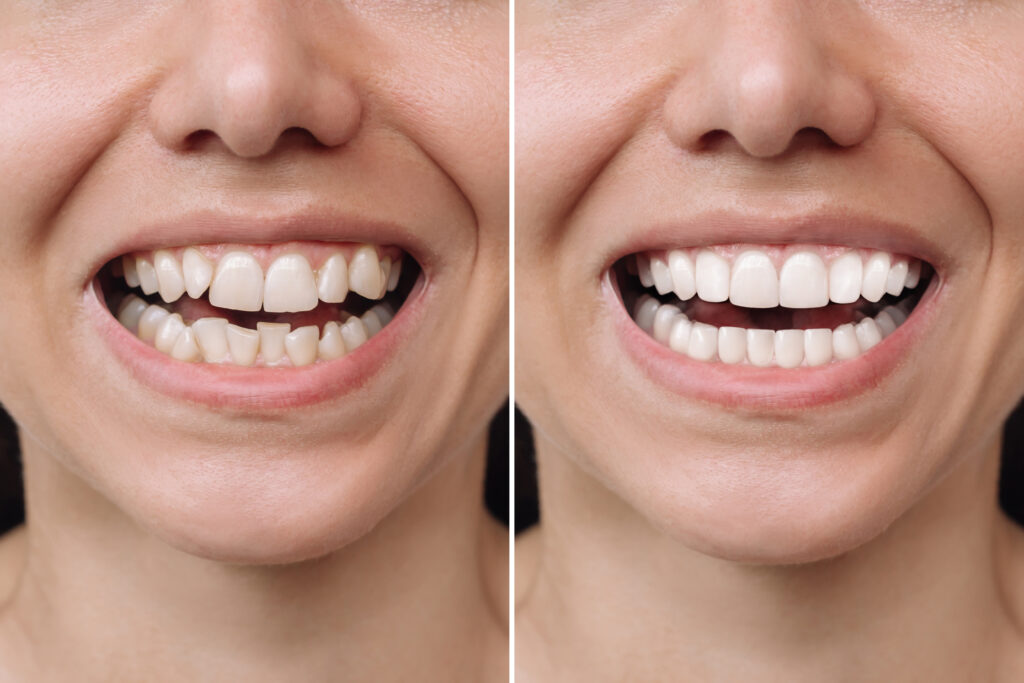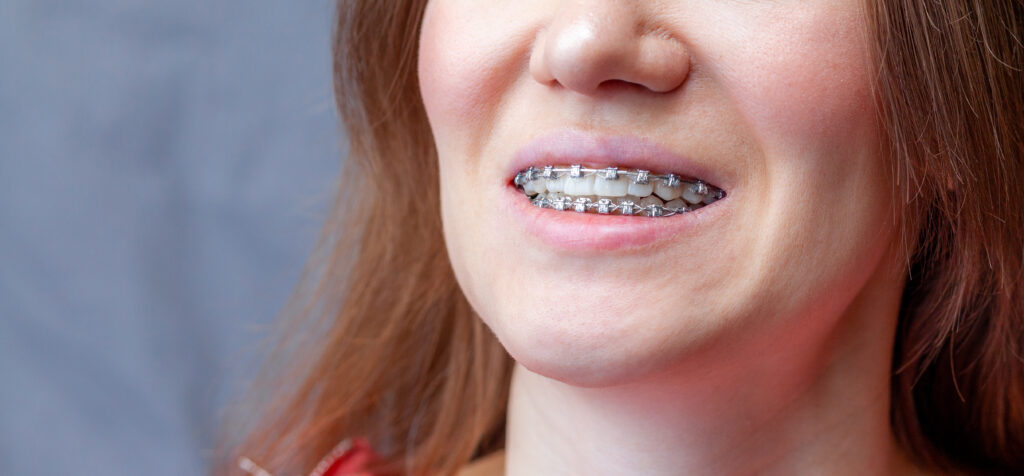(801) 212-9061
7555 Center View Ct Suite 104 West Jordan, UT 84084
Underbite Correction in West Jordan

An underbite is a common dental condition where the lower teeth come farther forward than the upper teeth, this can affect both oral health and beauty. This condition can lead to challenges in biting, chewing, speaking, and can sometimes impact self-esteem.
If you or your loved one is experiencing an underbite contact us today to schedule a consultation. (801) 212-9061
Underbite Correction: Techniques and Treatments
The first step in treating an underbite is a thorough dental exam. This often involves X-rays, dental impressions, or 3D imaging to assess the severity and structure of the underbite.
Several orthodontic methods are used for underbite correction:
- Braces: Traditional braces can be effective, especially in mild cases, by gradually moving the teeth into the correct position.
- Clear Aligners: For less severe underbites, clear aligners can be a discreet alternative to braces.
- Palate Expanders: In some cases, especially in children, a palate expander is used to widen the upper jaw and correct the underbite.
For severe underbites orthognathic surgery may be necessary. This involves repositioning the jaw to correct the underbite.
Post-treatment care is crucial for maintaining the results. This may include wearing retainers and regular dental check-ups.

Common Misconceptions about Underbite Correction
Misconception: Underbite Correction Is Only Cosmetic
Fact: While improving facial appearance is a significant aspect, the primary goal is to enhance oral function, prevent wear and tear on teeth, and improve overall dental health.
Misconception: Underbite Correction Is Always Surgical
Fact: Surgery is not always required. Many cases, especially if treated early, can be resolved with orthodontic approaches like braces or aligners.
Misconception: Treatment Is Only for Children or Teens
Fact: Although it’s ideal to address underbites early, adults can also undergo successful underbite correction through various treatments.
Correcting an underbite goes beyond beauty; it’s a significant step towards better oral health, functionality, and self-confidence.
If you or your loved ones are dealing with an underbite, our clinic is here to help. Schedule a Free consultation and explore your options for underbite correction. (801) 212-9061
Ortho Doctor

School
Platinum Dental of West Jordan
(801) 212-9061
Frequently Asked Questions
An underbite is a dental condition where the lower teeth protrude beyond the upper front teeth, creating a bulldog-like appearance in the lower face. It’s the opposite of an overbite, where the upper teeth overlap the lower teeth. Underbites can range from mild to severe and are usually caused by genetic factors, but habits like thumb-sucking or prolonged use of a pacifier in childhood can also contribute.
Correcting an underbite is important not only for aesthetic reasons but also for oral health and functionality. An underbite can cause difficulties in biting and chewing, speech impediments, increased wear on tooth enamel, and may lead to jaw pain and temporomandibular joint disorders (TMJ).
Treatment options vary depending on the severity of the underbite. They can include orthodontic approaches like braces or clear aligners, and in more severe cases, orthognathic surgery to reposition the jaw. For children and young teens, growth modification devices or expanders may be used to guide the development of the jaw.
The duration of underbite correction depends on the treatment method and the underbite’s severity. Orthodontic treatments alone can take anywhere from one to three years, while surgical options may have a quicker but more intensive recovery period.
While the correction procedures themselves are not painful due to anesthesia, some discomfort, swelling, or soreness can be expected during the recovery or adjustment periods. This is typically manageable with medication and following your orthodontist’s or surgeon’s care instructions.
Yes, adults can undergo underbite correction. Although treatment may take longer in adults than in children or teenagers due to the maturity of the jawbone, many adults achieve significant improvements and even complete correction.
Not correcting an underbite can lead to chronic dental issues, including increased wear and tear on teeth, higher risk of tooth decay and gum disease, jaw pain, and potentially severe TMJ disorders. Additionally, untreated underbites can affect one’s self-esteem and confidence.
Maintaining excellent oral hygiene is crucial during underbite correction. This includes regular brushing, flossing, and, if wearing braces, using special orthodontic cleaning tools. Regular dental check-ups are also important to monitor progress and address any issues.
Yes, wearing a retainer after underbite correction is typically necessary to maintain the new position of your teeth and prevent relapse. Your orthodontist will provide specific instructions on how long and how often to wear your retainer.
Coverage for underbite correction varies depending on your dental insurance plan and whether the treatment is considered cosmetic or medically necessary. It’s advisable to consult with your insurance provider to understand your coverage details.
BOOKING HOURS
M 8AM–5PM | Tu 8AM–5PM | Wed 7AM–6PM | Th 8AM–5PM | Fr 8AM–5PM
We are OPEN for ALL dental care procedures and emergency needs. Protecting the health and safety of our patients, families, and team members remains our number one priority.
Free $50 Gift Card*
$50 Gift Card when you complete an appointment with us!
*Redeemable after completed paid treatment. Must be a new patient to our organization and must not have been seen in ANY OF OUR LOCATIONS. The patient will receive a gift card via email or SMS after completion of their appt.
Free Exam & X-ray^
For New Patients without insurance we offer Free Exam and X-rays!
^For New Patients that do not have dental insurance. New patients must be 18 or older to receive free exam and x-rays. Discounts cannot be combined with other offers or dental discount plans. Additional fees may be included in individual cases.
$99 Hygiene Visit^^
For New Patients without insurance we offer Free Exam and X-rays!
^^For new patients without dental insurance. Includes Exam, X-Ray and Routine Cleaning. A Periodontal Cleaning requires additional fees, and rescheduled for further treatment. Cannot be combined with other offers or dental discount plans.

